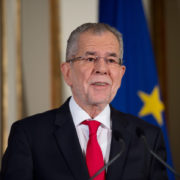As March 1 is approaching, the deadline of trade talks between US and China, the depth of the rift between the two countries is clearer by the day. The list of US concerns is well beyond commerce, market access, theft of Intellectual Property Rights or undue support to Chinese State Owned Enterprises.
Strategic and military issues are beginning to clutter the agenda of the US State Department and the Pentagon with growing concern about Beijing’s presence in disputed areas, like the South China Sea, or over the Cyberspace, about the future development of the next broadband standard of 5G.
Yet, after all of this, perhaps part of the reason for all of this seems to be China’s surprising misunderstanding of what America really is.
In fact, unlike the official Chinese storytelling, America is not a country: it is a global system of power and influence, and it is an empire imperium as the original Latin word taken from ancient Rome implied: an organization of command.
Imperium or Diguo 帝国?
Ancient Rome actually was an empire long before having an emperor. Its empire was built on layers. There was the city and the socies, allies, also divided into many layers, with multilateral and bilateral agreements, all with different rights and duties. The Phoenician empire, built by its rival Cartago, was similar, and they both were modelled after the Greek Spartan and Athenian empires or the Phoenician city states of what is now modern Lebanon.
The complicated Roman cobweb of relations held off better than the Carthaginian empire, possibly because the Roman system was fairer than the Phoenician one. We know that Hannibal failed not militarily but politically in his invasion of Italy in 218 BC. The Greek cities in southern Italy, just recently subdued by Rome, did not revolt and failed to join Hannibal, as the Carthaginians hoped for. However, when the Roman legions set foot in Africa, in the counteroffensive devised by the Roman general Scipio by copying Hannibal’s plan, the Romans managed to find the local Numidian horsemen turning against Cartago.
This is roughly also how America works now.
This is also very different from how the Chinese empire was devised. The Chinese emperor, at least since the first unification in 221 BC (roughly the time of Hannibal’s war!), didn’t have allies or a network of confused and confusing relations. He had a clear-cut system of efficient command and control that enabled him to reach directly to even the farthest corners of his dominion. The territory outside his realm was physically and symbolically cut out by a wall.
Out of the direct administration there was a system of foreign relations with different people, but there was a very clear difference between in and out – unlike with Rome where since very early on “in” and “out” were confused, with allies and even former enemies called to be part of the Roman Senate.
The Chinese clear territorial administration was imported to Europe in the 17th and 18th centuries, thanks to the translations and missionary work in the West of the Jesuits. Modern Western states, including the US, are also born out of this Chinese concept. But the American empire, like the preceding British empire, also inherited the idea of building a network of different alliances.
America is then a modern country, with some aspects of the traditional Chinese state, but it has many multilateral and bilateral alliances, like NATO or treaties with the UK, the EU, or each EU country, for instance. Then there are systems of associations, think tanks, meetings, ambassadors, the media, et cetera. All of them are not reporting to a vertical head of state but create what the Americans like to call “traction” in one direction or another.
Here the production of power comes from many sources: universities, media, think tanks, and politicians. But mainly it is through ideas that they must engage in the ongoing debate, and in this debate, they must be convincing. Then there is also money, funding ideas. But money without strong ideas doesn’t go very far.
The English China experience in 1840
China confronted a similar situation with England in 1840. England, which defeated China in a limited military confrontation over free trade, which then incidentally was about opium, was not just a small island in a distant part of Europe. It was a system of power that had conquered India’s Mughal Empire. For a time in the 17th century, The Mughal Empire was possibly the richest country in the world, and in Europe in the early 19th century, England was considered mightier than the Russians, who had been pushing the Manchu east for almost two centuries.
Like the British empire, and the Roman and Hellenistic empires before that, the modern US empire has many levers and layers. It has military power and economic power, which are well known to China. But less understood are its political and ideal/ideological powers. All the foreign ambassadors in Washington and at the UN in New York engage in the ideological and cultural debates in America to try to gain some traction over a number of issues. In this, all and any can engage on an equal footing, like in the ancient Greek agora (market square), where anybody with citizen’s rights could peddle his wares or his ideas.
Modern and ancient philosophers debate here, and surely the dais (The New York Times or www.Settimananews.it) is important, but even more important, long-term, is the quality of the ideas peddled to an ideal community of equals. Anybody can take part in this debate, as long as he engages it – that is, faces the challenges posed to him.
This is a very different environment from the Chinese one, which got used to Mencius’s idea of the philosopher talking to the king and trying to persuade him. But the two here are not equals, and not anybody can talk to the king, just those who have gained the king’s trust and the trust of his aides.
In fact, great philosopher Hanfei zi (living shortly after Mencius) was forbidden to talk to the Qin king Ying Zheng (his name before being called the First Emperor) by his prime minister Li Si (who had been Hanfei zi’s best friend). Li Si was afraid Hanfei would manage to dissuade Ying Zheng from invading the state of Han (of which Hanfei was a prince), so Li Si had Hanfei imprisoned and executed before he could talk to the king.
One could see ideas moving like waves up and down in Athens, according to Thucydides account of the war with Sparta, for this or that initiative, and eventually pushing, for instance, for the disastrous Sicilian expedition of 415 BC.
Yes, master controller Li Si was right and the confusing Athenian agora on Sicily was wrong. But the Greek agora triumphed over the tyrannical Persian empire, and the controlling Qin court brought everything to ruin just after the First Emperor’s death.
The point here is that America is like Greece, and everybody is joining in the debate, friends and foreigners. Calling oneself out of the debate is admitting defeat, and one can be excluded and expelled. This open debate is the backbone and lifeblood of the US system of political and economic alliances.
In this modern debate there are rules: you must express free ideas, as free as possible from any strings, political or financial, to be gauged for what they truly are – ideas, analysis. Then, of course, everybody knows there are limits to freedom, but speaking for or with the support of an authoritarian institution or country, as China is perceived now, excludes one from the debate, because it is assumed (is it wrong?) that anybody speaking for China is expressing President Xi Jinping’s view. Then there is no need to engage with his minions; Xi can speak for himself if he feels like engaging in a public debate. If Chinese leaders don’t, they are admitting their shortcoming and their defeat in the imperial agorà.
Debaters ergo allies
The exercise of this constant public debate is the main force of the political/cultural drive in the US system, it is the nuts and bolts of American “soft power”and without being part of this debate, because it is without freedom/democracy, China is naked, unarmed. China may have a large army and a powerful economy, but it has no system of alliances and no part in international public debate.
The old USSR rejected the Western debate and started its own international discourse, delinked from the Western one, initially through the organization of the Third International. The Soviet debate became with years more isolated, stifled, and thus unappealing, while the Western debate came to absorb and accept many of the themes of the Communist debate such as the need for greater social justice. But the initial presence of this Communist debate was a strong challenge to Western debate and thus the two systems grew confrontational with one another.
China is different. It is not part of the Western debate, but it doesn’t have a real alternative international debate. If China did, it would be openly challenging the Western system, something that so far it has refrained from doing. Moreover, the US is the global cultural model, and it has been so for at least a century.
In 1840, before the Opium War, China had been the cultural model for Europe for about two centuries. Europe changed its administration and possibly entered the Enlightenment inspired by China. Nothing like this is happening now.
Then the problem perhaps for China is how to join the global debate of ideas, centered in the US. But for this, at this point, significant political reforms might be in order. In fact, by being out of this system of alliances and debate, China is not just confronting the US state, but it is challenging the US empire, something that the US or the members of the empire will have a hard time accepting, because it would bring down the whole present world order – an order in which so far China has been the main beneficiary.





